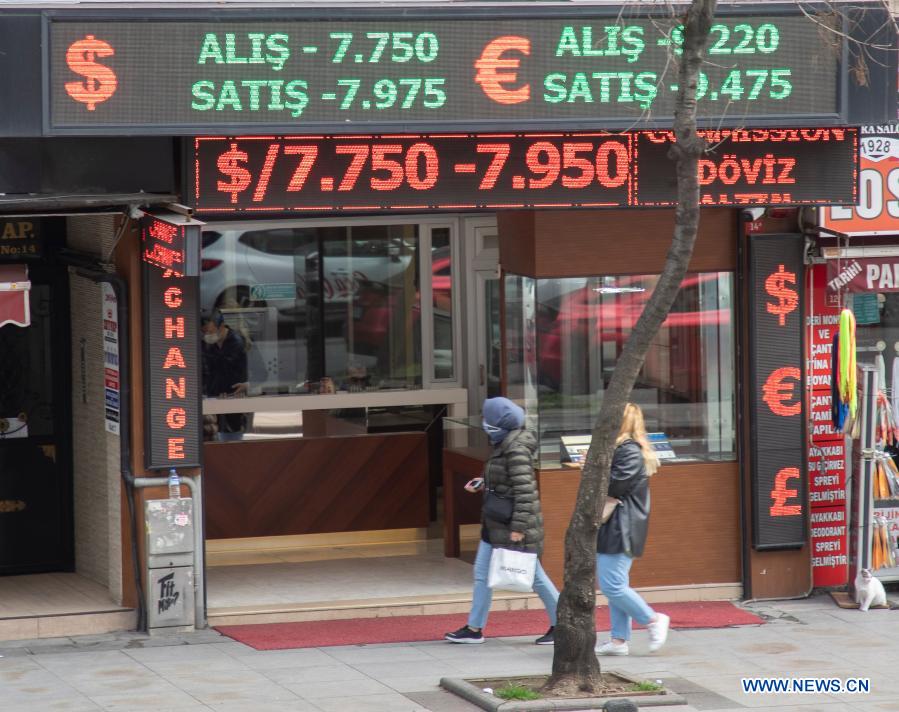
Pedestrians walk past a currency exchange in Istanbul, Turkey, on March 22, 2021. Turkey's currency plunged around 11 percent on Monday after Turkish President Recep Tayyip Erdogan fired the central bank governor and appointed a critic of high interest rates, a move sparking turbulence in markets. Turkish lira was fluctuating at 8.02 against the U.S. dollar in Monday's morning trading, a sharp decline from Friday's closing level of 7.22, while the Turkish currency was also down 11 percent against the euro. (Photo by Osman Orsal/Xinhua)
ISTANBUL, March 22 -- Turkey's currency plunged around 11 percent on Monday after Turkish President Recep Tayyip Erdogan fired the central bank governor and appointed a critic of high interest rates, a move sparking turbulence in markets.
The lira was fluctuating at 8.02 against the U.S. dollar in Monday's morning trading, a sharp decline from Friday's closing level of 7.22, while the Turkish currency was also down 11 percent against the euro.
On Saturday, Erdogan abruptly removed Naci Agbal from the post of the central bank governor with a presidential decree, nearly five months after the appointment of Agbal to the post.
The dismissal followed a 200 basis point interest rate hike imposed by the central bank on Thursday to fight double-digit inflation, with the benchmark policy rate rising to 19 percent.
Agbal, who served as the Turkish finance minister between 2015 and 2018, increased the benchmark interest rate by a total of 875 basis points in several hikes since he took the helm in November 2020, trying to restore monetary discipline in the emerging market.
He was replaced by Sahap Kavcioglu, an economist and columnist who becomes Turkey's fourth central bank chief since July 2019.
On Sunday, the new bank governor, also a former lawmaker from Erdogan's ruling Justice and Development Party, held an online conference with heads of private and public lenders and pledged to use monetary policy tools to deliver price stability.
"The Central Bank of the Republic of Turkey will continue to use the monetary policy tools effectively in line with its main objective of achieving a permanent fall in inflation," he said in a statement.
Erdogan, who believes that high-interest rates would cause rather than curb inflation, has frequently said he is opposed to high interest rates. Likewise, the new bank governor, Kavcioglu, is reportedly also against rate rises.
Analysts have said that the surprising move will likely harm investors' confidence in the Turkish economy.
Finance professor Burak Arzova from the Istanbul-based Marmara University told Xinhua that the decision to sack the central bank governor "who had done what is necessary to stabilize the Turkish currency would inevitably increase risks for the economy."
"Uncertainties remain" regarding inflation and price stability, Arzova said, noting that the lira will be under strong pressure as Ankara's foreign currency reserves are low.
"It looks like the central bank's efforts to fight the country's inflation problem may come to an end," Capital Economics, an economic research company, said in a note.
As Turkey's inflation reached 15.6 percent in February, its highest since mid-2019, the government wants to bring the annual inflation to below 10 percent by the end of 2022.
Erdogan recently announced a new economic strategy, vowing to prioritize the fight against the rise in consumer prices and bring inflation back down to single digits.
Since a currency crisis in 2018, Turkey has experienced economic and geostrategic difficulties. The COVID-19 pandemic also exacerbated its financial troubles.













